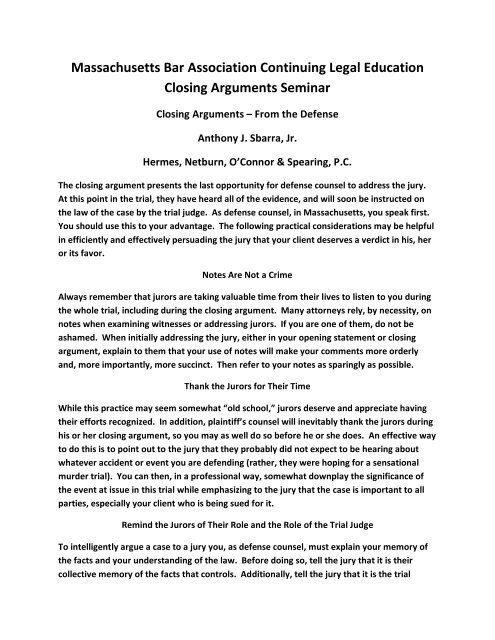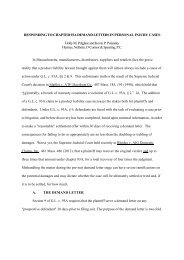From the Defense. Winning Closing Arguments Seminar - Hermes ...
From the Defense. Winning Closing Arguments Seminar - Hermes ...
From the Defense. Winning Closing Arguments Seminar - Hermes ...
Create successful ePaper yourself
Turn your PDF publications into a flip-book with our unique Google optimized e-Paper software.
Massachusetts Bar Association Continuing Legal Education<br />
<strong>Closing</strong> <strong>Arguments</strong> <strong>Seminar</strong><br />
<strong>Closing</strong> <strong>Arguments</strong> – <strong>From</strong> <strong>the</strong> <strong>Defense</strong><br />
Anthony J. Sbarra, Jr.<br />
<strong>Hermes</strong>, Netburn, O’Connor & Spearing, P.C.<br />
The closing argument presents <strong>the</strong> last opportunity for defense counsel to address <strong>the</strong> jury.<br />
At this point in <strong>the</strong> trial, <strong>the</strong>y have heard all of <strong>the</strong> evidence, and will soon be instructed on<br />
<strong>the</strong> law of <strong>the</strong> case by <strong>the</strong> trial judge. As defense counsel, in Massachusetts, you speak first.<br />
You should use this to your advantage. The following practical considerations may be helpful<br />
in efficiently and effectively persuading <strong>the</strong> jury that your client deserves a verdict in his, her<br />
or its favor.<br />
Notes Are Not a Crime<br />
Always remember that jurors are taking valuable time from <strong>the</strong>ir lives to listen to you during<br />
<strong>the</strong> whole trial, including during <strong>the</strong> closing argument. Many attorneys rely, by necessity, on<br />
notes when examining witnesses or addressing jurors. If you are one of <strong>the</strong>m, do not be<br />
ashamed. When initially addressing <strong>the</strong> jury, ei<strong>the</strong>r in your opening statement or closing<br />
argument, explain to <strong>the</strong>m that your use of notes will make your comments more orderly<br />
and, more importantly, more succinct. Then refer to your notes as sparingly as possible.<br />
Thank <strong>the</strong> Jurors for Their Time<br />
While this practice may seem somewhat “old school,” jurors deserve and appreciate having<br />
<strong>the</strong>ir efforts recognized. In addition, plaintiff’s counsel will inevitably thank <strong>the</strong> jurors during<br />
his or her closing argument, so you may as well do so before he or she does. An effective way<br />
to do this is to point out to <strong>the</strong> jury that <strong>the</strong>y probably did not expect to be hearing about<br />
whatever accident or event you are defending (ra<strong>the</strong>r, <strong>the</strong>y were hoping for a sensational<br />
murder trial). You can <strong>the</strong>n, in a professional way, somewhat downplay <strong>the</strong> significance of<br />
<strong>the</strong> event at issue in this trial while emphasizing to <strong>the</strong> jury that <strong>the</strong> case is important to all<br />
parties, especially your client who is being sued for it.<br />
Remind <strong>the</strong> Jurors of Their Role and <strong>the</strong> Role of <strong>the</strong> Trial Judge<br />
To intelligently argue a case to a jury you, as defense counsel, must explain your memory of<br />
<strong>the</strong> facts and your understanding of <strong>the</strong> law. Before doing so, tell <strong>the</strong> jury that it is <strong>the</strong>ir<br />
collective memory of <strong>the</strong> facts that controls. Additionally, tell <strong>the</strong> jury that it is <strong>the</strong> trial
judge’s instructions regarding <strong>the</strong> law that controls. Explain to <strong>the</strong>m that if your rendition of<br />
<strong>the</strong> facts does not completely coincide with <strong>the</strong>irs, <strong>the</strong>y should substitute <strong>the</strong>ir memory. Also<br />
explain that if your version of <strong>the</strong> law is at any way at odds with <strong>the</strong> trial judge, he or she is<br />
absolutely right.<br />
Refer To Your Opening Statement<br />
In your opening statement, you will have outlined <strong>the</strong> important areas of disagreement in <strong>the</strong><br />
case, i.e., <strong>the</strong> defendant was not at fault and should not be blamed, or, <strong>the</strong> plaintiff was not<br />
really injured or, if injured, not as seriously as alleged. You should refer to those points<br />
repeatedly in your closing argument. Highlight <strong>the</strong> testimony of favorable witnesses and<br />
utilize any favorable exhibits. Tell <strong>the</strong> jury that in your opening you said that Mr. “so and so”<br />
was going to say “thus and such” and remind <strong>the</strong>m that he did exactly that. Also and perhaps<br />
more importantly, if any of <strong>the</strong> plaintiff’s promised evidence was not forthcoming, emphasize<br />
that as well.<br />
Explain <strong>the</strong> Burden of Proof<br />
Even in civil cases, <strong>the</strong> burden of proof is <strong>the</strong> friend of defense counsel. You should remind<br />
<strong>the</strong> jurors that in Massachusetts one cannot find “for <strong>the</strong> plaintiff” but ra<strong>the</strong>r, in order for <strong>the</strong><br />
plaintiff to recover, <strong>the</strong> jury must find “against <strong>the</strong> defendant.” This is a significant difference<br />
and must be stressed. The dramatic TV scene with a jury finding for a plaintiff is not <strong>the</strong> way<br />
it works in a Massachusetts Superior Court. In addition, with respect to questionable issues<br />
on liability or damages, you should argue to <strong>the</strong> jury that if <strong>the</strong>y cannot “figure it out,” <strong>the</strong><br />
plaintiff has failed to meet his, her or its burden, and <strong>the</strong> defendant must prevail. Put simply,<br />
<strong>the</strong>re are no ties in Superior Court.<br />
Deal With Sympathy<br />
All decent human beings, presumably including <strong>the</strong> jurors, feel sympathy. You should<br />
acknowledge this and not shy away from it. Explain to <strong>the</strong> jury that sympathy is a noble<br />
virtue, but that it has no place in <strong>the</strong> deliberating room. The jurors took an oath to follow <strong>the</strong><br />
law, and <strong>the</strong>y will be instructed to not allow sympathy to come into play. Tell <strong>the</strong>m that you<br />
have no doubt that <strong>the</strong>y can and will abide by this instruction.<br />
Try to Use <strong>the</strong> Judge’s Words<br />
Before <strong>the</strong> closing argument, you will likely have had an opportunity to discuss <strong>the</strong> trial<br />
judge’s proposed jury instructions during a charge conference. You should attempt to<br />
determine as best you are able exactly how <strong>the</strong> judge will explain <strong>the</strong> applicable principles of<br />
law to <strong>the</strong> jury. When addressing <strong>the</strong>m during your closing, you should use, to <strong>the</strong> extent you
can, <strong>the</strong> same vocabulary you expect <strong>the</strong> judge to use. For example, if you learn that <strong>the</strong><br />
judge defines negligence in a certain manner, use that definition yourself. During <strong>the</strong> jury<br />
instructions, <strong>the</strong> more often you sound like <strong>the</strong> trial judge <strong>the</strong> better.<br />
Use Exhibits<br />
While jurors pay close attention to live testimony, if <strong>the</strong>y have something in <strong>the</strong>ir hands while<br />
deliberating it may be much more persuasive. If you have favorable exhibits, use <strong>the</strong>m<br />
during your closing. Photographs are particularly impressive. If you have good ones, take<br />
<strong>the</strong>m out of <strong>the</strong> power point, blow <strong>the</strong>m up, put <strong>the</strong>m on poster board and get <strong>the</strong>m into <strong>the</strong><br />
jury room. Medical records often also contain unexpected, but favorable items. You should<br />
review <strong>the</strong> medical records submitted by <strong>the</strong> plaintiff carefully. Sometimes, explanations as<br />
to how <strong>the</strong> accident happened, while arguably inadmissible, will actually be put into evidence<br />
by <strong>the</strong> plaintiff. Should that occur, you are free to comment about <strong>the</strong>m. It is sometimes<br />
effective to resist <strong>the</strong> temptation to present ei<strong>the</strong>r <strong>the</strong> plaintiff or ano<strong>the</strong>r witness with <strong>the</strong>se<br />
types of notations during cross-examination and, ra<strong>the</strong>r, simply to refer to <strong>the</strong>m during <strong>the</strong><br />
closing. For example, if <strong>the</strong> plaintiff has described <strong>the</strong> accident to an emergency room<br />
physician in a different way than he or she has testified, you can read that record to <strong>the</strong> jury<br />
and argue that <strong>the</strong> earlier version is more credible.<br />
Explain Agreements<br />
Many times you will enter into agreements with plaintiff’s counsel with respect to <strong>the</strong><br />
admissibility of certain evidence. This often occurs with medical bills and records. If you<br />
have agreed to <strong>the</strong> admissibility of those documents, you should explain to <strong>the</strong> jury exactly<br />
what <strong>the</strong> agreement was. Tell <strong>the</strong>m that in order to save <strong>the</strong>m time you conceded that <strong>the</strong><br />
doctors and o<strong>the</strong>r medical personnel would have testified to <strong>the</strong> fair and reasonable value of<br />
<strong>the</strong> medical services rendered. Emphasize, however, that you did not agree that <strong>the</strong><br />
defendant owes <strong>the</strong> plaintiff for those services.<br />
Explain Surveillance<br />
Jurors may be somewhat justifiably, at first blush, offended by your use of surveillance<br />
materials at trial. You must diffuse this offense by explaining that <strong>the</strong> plaintiff has sued your<br />
client, wants to be paid by your client and was untruthful to boot. Explain that <strong>the</strong><br />
surveillance was performed in public places only, and acknowledge that we all have certain<br />
privacy rights.
Refer to <strong>the</strong> Special Verdict Slip<br />
Prior to <strong>the</strong> closing, you will have had <strong>the</strong> opportunity to review <strong>the</strong> special verdict slip which<br />
will be presented to <strong>the</strong> jury. Use <strong>the</strong> verdict slip while making <strong>the</strong> closing argument. Go<br />
through each question and explain why <strong>the</strong>y should all be answered in <strong>the</strong> defendant’s favor.<br />
Remind <strong>the</strong> Jury of <strong>the</strong> Bottom Line<br />
All civil suits are about money. Do not be reluctant to remind <strong>the</strong> jury of that fact. If<br />
appropriate, use <strong>the</strong> financial interest of <strong>the</strong> plaintiff to question his or her credibility. It may<br />
be appropriate to argue that no one should leave <strong>the</strong> courthouse in a better position than<br />
before <strong>the</strong> accident occurred. On <strong>the</strong> o<strong>the</strong>r hand, if some award is justified and <strong>the</strong> parties<br />
just cannot agree on value, ask <strong>the</strong> jury to be fair. Explain to <strong>the</strong>m that being fair to <strong>the</strong><br />
plaintiff will result in fairness to <strong>the</strong> defendant.



